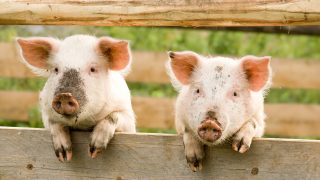
Legislation – State Bills
Strengthening Laws that Protect Animals and Striking Down Laws Hurting Animals
The Animal Legal Defense Fund works at the state and local levels to advance important legislation. We advocate for laws that promote or protect the lives and interests of animals, and we oppose legislation that would be detrimental to animals’ well-being.
We also work closely with the Animal Legal Defense Fund’s other programs to identify opportunities to create model legislation that address strategic legal issues in the areas of civil and criminal law, and monitor legislation that impacts animals at the state and local levels.
State Bills

Retail Pet Sales Ban Bills (Massachusetts)

Pet Custody (Massachusetts)

Civil Immunity Bill “Good Samaritan Rule” (Washington)

Octopus Farming Ban (New Jersey)

Ensuring Wildlife Connectivity Act (Washington)

Courtroom Animal Advocate Program (Michigan)

A Bill to Ban Wild Animals in Circuses (New York)

Humane Pet Store Bill (New Jersey)

A Bill to Ban the Sale of Fur Products (Hawaii)

The Mink Facility Disease Prevention Act (Illinois)

Oppose: Ag-Gag Bill to Prohibit Photography (Kentucky)

Transparency in Animal Testing (Missouri)

Octopus Farming Ban (Hawaii)

Ending the Intensive Confinement of Hens Used in the Egg Industry (Maryland)

Cat Declawing Ban (Illinois)

An Act concerning the surgical declawing of cats and other animals (New Jersey)

Mass Animal Fund (Massachusetts)

An Act Prohibiting the Removal of Claws from Cats (New Hampshire)

Prohibiting harmful practices and devices at rodeos (Los Angeles, CA)

Promote Alternatives to Cosmetics and Product Testing on Animals (Massachusetts)

Animal Possession Ban (Massachusetts)

Pets in Housing (Massachusetts)

Ryder’s Law

An Act Concerning the Feeding of Black Bear (New Jersey)

Prohibit Cat Declawing (California)

Oppose: SJR 3 Puts Ohio Wildlife in Danger (Ohio)

Citations for Cruel Conditions for Animals (Massachusetts)

Authorizing Municipalities to Prohibit the Sale of Dogs, Cats, and Rabbits in Pet Shops (Connecticut)

Courtroom Animal Advocate Program (New York)

Courtroom Animal Advocate Program (New Jersey)

